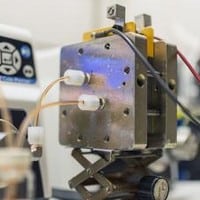Harvard researchers have discovered vitamin B2 molecule tweakery creates a good candidate for energy storage in the form of a redox flow battery.
Flow batteries can store large amounts of energy quite cheaply; but one of their drawbacks is they often use rare earth metals and/or toxic compounds.
The Harvard team have been working on cheaper non-toxic, non-corrosive and non-flammable flow batteries for quite some time. Last year we reported on their work on a “green” residential flow battery; using ferrocyanide – which sounds pretty nasty but is actually quite safe.
The team have continued looking at various compounds in an effort to improve performance.
They had been focusing on quinones, molecules that store energy in plants and animals. However, nature has other mechanisms for enabling energy storage.
For example, vitamin B2 (riboflavin) helps to store energy from food in the body. The B group vitamins play an important role in converting the carbohydrates in food into fuel (glucose) and also metabolizing fats and proteins.
Recognising the potential, the team turned its attention to B2 and found success.
“With only a couple of tweaks to the original B2 molecule, this new group of molecules becomes a good candidate for alkaline flow batteries,” says Professor Michael J. Aziz, one of the researchers.
“They have high stability and solubility and provide high battery voltage and storage capacity. Because vitamins are remarkably easy to make, this molecule could be manufactured on a large scale at a very low cost.”
The molecules can be synthesized in high yield at room temperature utilizing a single-step coupling of inexpensive o-phenylenediamine derivatives and alloxan.
The team’s work so far has resulted in a redox flow battery demonstrating an open-circuit voltage approaching 1.2 V, a current efficiency of 99.7% and capacity retention exceeding 99.98% per cycle.
“Theoretical studies indicate that structural modification of alloxazine with electron-donating groups should allow further increases in battery voltage.”
This discovery creates a new universe of materials that the researchers will continue to explore, along with its ongoing research into quinones.
The team’s research on the “vitamin B” battery was recently published in the journal Nature, under the title ” A redox-flow battery with an alloxazine-based organic electrolyte”.







































